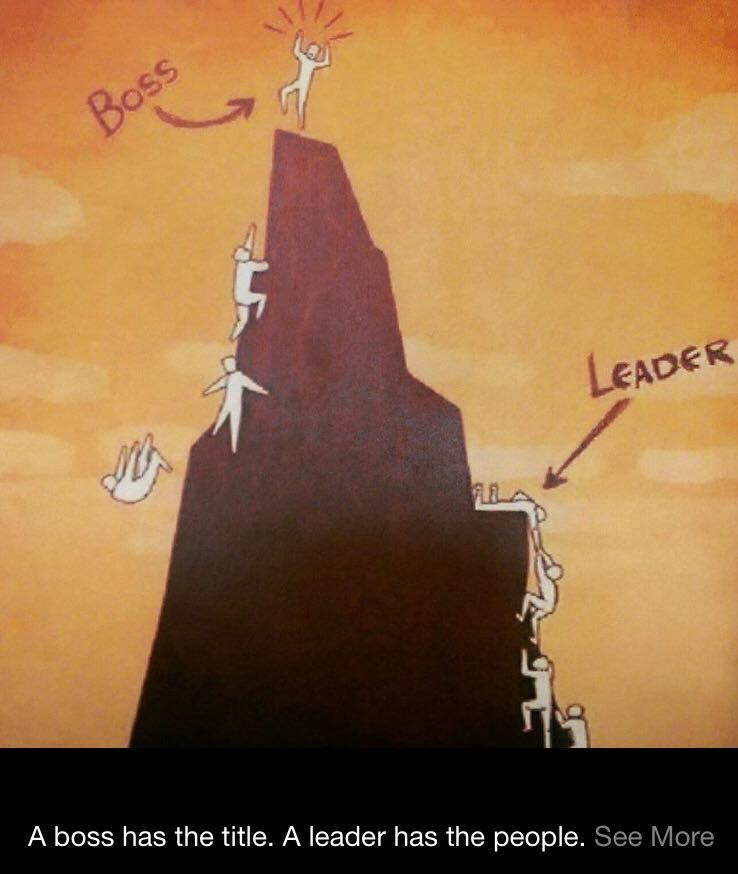I returned late last night from a conference in Canada put on by Gymnastics Newfoundland and Labrador. One of my longest presentations was on LEADERSHIP and CONFLICT RESOLUTION (a 3 hour lecture! Bless those poor people who had to sit there and listen to me for 3 hours!). The analogy I came up with was that having a plan to resolve conflict was like having an airbag for your car. It’s good to know you have one. But its better to avoid the situation that causes you to need it. I believe a good leader can avoid conflict.
There are many leaders in your gym. The Head Coach is a leader. Your Program Directors are leaders. The Owner must certainly be a leader.
Are YOU a leader or are you just a BOSS?
Bosses like to play it safe — leaders practice taking risks
Many people view the terms “boss” and “leader” as interchangeable — but they are vastly different. To determine which one you are, I encourage you to honestly answer this question:
Do you:
a) see the people you work with as an aggravating necessity that you have to put up with in order to accomplish day-to-day activities and achieve goals?
Or, do you:
b) truly enjoy working with people on your “team” to meet your goals and deliverables?
If you chose a), you’re probably more of a boss; if you chose b), you’re probably more of a leader.
I view the people who work in my gyms as part of a TEAM. We are working towards a common goal. Based on my work in the gym for the past 25 years — and, of course, common sense — I can confidently say that the teams which produce the most effective and long-lasting results are the ones directed by leaders, not bosses. So, how do you move from “boss” to “leader”?
Here are seven key ways:
1. Love people.
No one can lead a team well unless he or she truly enjoys working with people. People are not minions; they are individuals with unique personalities, traits and talents. As a leader, you must enjoy helping people and watching them succeed. You need to know their likes and dislikes! (my Saturday morning team LOVES donuts!)
2. Guide, don’t control, your team.
Bosses feel the need to control every action; they’re micromanagers. Leaders know that their team will accomplish great things if they receive direction and support rather than control. A good leader will establish frameworks and structure, then empower their team to get the work done, providing support along the way.
3. Be adaptable.
Bosses tend to be very rigid in the way they want things done, but leaders understand that they must adapt their personal style to their team members’ needs. They understand and value each team member’s individuality, establish expectations clearly and adapt their leadership approach as necessary. If you share a common goal with your staff, IT IS OK if they take a slightly different path to get there.
4. Delegate.
Bosses may feel they are delegators, but because they don’t trust anyone else to do the job as well as they can, they never fully delegate anything. Leaders truly delegate. They assign tasks, and then let go (though they still follow up periodically to ensure their team members are on track to achieve the desired results). This was the most difficult thing for ME! I would delegate but still try to be TOO involved with the job. It was not until I truly gave responsibility away that I saw the real potential of my team.
5. Give credit, accept blame.
Bosses love to take credit for their teams’ successful results — and they’re the first to throw them under the bus when those goals are not achieved as desired. Leaders, in contrast, know their success comes from their teams’ efforts, so they keep their egos in check: They showcase their teams’ efforts when they succeed, and they accept personal responsibility when they fail. Personal motto: Praise publicly, punish privately.
6. Practice risk acceptance.
Bosses avoid risks at all costs because they are fearful that going out on a limb might produce a perceived failure — they like to play it safe. But leaders know that the greatest successes come from taking risks. Leaders enable and encourage their teams to try new things, and they see every so-called mistake or failure as an opportunity to make improvements.
7. Motivate.
Bosses motivate through fear. Leaders, in contrast, motivate by figuring out what sparks their individual team members to perform at their highest potential, and by expecting greatness from their teams even when those individuals don’t see greatness in themselves. Leaders also cheer and celebrate successes, small and large, because they know they are their teams’ biggest fans.
Going from “boss” to “leader” is a challenging personal development experience — but it’s extremely rewarding, too! If you act like a leader, your staff members will produce long-lasting effective results. They tend to be more engaged at work, and more fulfilled in their personal lives, too. In that way, developing from boss to leader is an act of kindness and service to your fellow human beings — and to yourself, as well.





